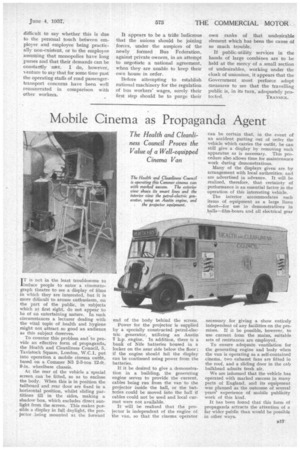Monopolies a Prey to Strikes D URING the past few weeks,
Page 50

Page 51

If you've noticed an error in this article please click here to report it so we can fix it.
the bus industry has been engulfed in a wave of labour troubles, which has swept the country from north to south. The Transport and General Workers Union has been powerless to prevent numerous provincial un°facial strikes, whilst the Union itself has sponsored the London dispute, ultimately culminating in strike action.
We have seen in the raw the greatest disadVantage of transport combines and semi-socialistic monopolies. Scant consideration has been paid to any factor of time and place, and bitter war has been waged, irrespective of public opinion or convenience.
• Public Disappointed.
There can be little doubt•that the general public is sadly disillusioned with regard to the brain-child of Mr. Herbert Morrison. That such an undertaking as London Transport should be no more invulnerable to labour troubles than the companyowned business is disquieting and the future attitude of transport users to the formation of similar bodies in the provinces is bound to be adversely affected.
The questions of working hours and the strain caused in driving public service vehicles in congested areas, such as London, tend to appeal to public sympathy, irrespective of the fact that the shorter hours demanded would involve the Board in hundreds of thousands of pounds 431 additional expenditure_
The State and Transport.
The problem raises large issups concerning the relations between a socialized industry and the State, as the latter fixed and has power at any time to alter 'several of the Board's financial obligations, the most important being the interest that has to be paid on stock. The interest fixed at the time of the formation of the Board was based upon the profits made by former owners, during the years 1928, 1929 and 1930.
It has been contended in certain circles that this was a period of prosperity and that the interest is now too high to be fair, either to the employees or to the public (the latter's concern being with fares). It must, however, be remembered that for a number of years the bus industry has been sheltered, trade fluctuations 816
having little effect on receipts. In consequence, wages are not so much subject to fluctuations as in other trades. During trade depressions, bus workers suffer less unemployment and enjoy more regular earnings than in other industries and therefore'. the prosperity gain .must be correspondingly less.
The industry has less chance of passing increased costs on to the consumer. Indeed, it is questionable whether it would be advisable to attempt to do so, as the adoption of such a course might merely result in reduced travel, without the anticipated advantage. This factor tends to stiffen the attitude of employers towards wage increases and/or reduced hours.
Daily Press comments on the situation have been particularly interesting and can be summarized as follow :— (1) If the Government should instruct the Board to concede to the men's demands and guarantee any loss which may result, it will amount to an unfair subsidy. There is no reason why the inhabitants of London should be provided with uneconomic travel and stock holders guaranteed an income at the expense of taxpayers, unless the taxpayer, through his or her representative in Parliament, be responsible for a situation which should never be repeated, i.e., the formation of similar bodies.
(2) Either fares must be raised or statutory profits must be reduced, as the Board states that it cannot otherwise concede to the men's request. This definitely shows the disadvantage of semisocialistic, semi-Fascist type authority,t including the inability of private owners to come to the assistance of the travelling public.
Withoutfurther discussing the pros and cons of the situation, it will generally be agreed that it was a great pity that the obsolete procedure of " strike first and inquiry after " should have been adopted, especially in view of the Board's 'offer that every aspect of the dispute should be the subject of a public inquiry and that any benefit resulting from it would date back to the commencement of the dispute.
From a close study of the position in the bus industry throughout the country, it would appear that monopolies undoubtedly tend to foster labour disputes and strikes. It is difficult to say whether this is due to the personal touch between employer and employee being practically non-existent, or to the employee assuming that monopolies have tong purses and that their demands can be constantly Wet. I do, however, .venture to say that for some time past the operating staffs of road passengertransport concerns have been well remunerated in comparison with other workers. It appears to be a trifle ludicrous that the unions should be joining forces, under the auspices of the newly formed Bus Federation, against private owners, in an attempt to negotiate a national agreement, when they are unable to keep their own house in order.
Before attempting to establish national machinery for the regulation of bus workers' wages, surely their first step should be to purge their own ranks of that undesirable element which has been the cause of so much trouble.
If public-utility, services in the hands of large combines are to be held at the mercy of a small section of undesirables, working under the cloak of unionism, it appears that the Government must perforce adopt measures to see that the travelling public is, in its turn, adequately pro tected. TRANSEX.




























































































